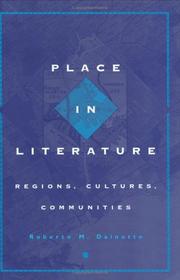| Listing 1 - 3 of 3 |
Sort by
|

ISBN: 0801436834 Year: 2000 Publisher: Ithaca, NY London Cornell University Press
Abstract | Keywords | Export | Availability | Bookmark
 Loading...
Loading...Choose an application
- Reference Manager
- EndNote
- RefWorks (Direct export to RefWorks)
Cadre (Littérature) --- Cadre du récit littéraire --- Communauté dans la littérature --- Communities in literature --- Community in literature --- Couleur locale dans la littérature --- Couleur locale in de literatuur --- Culture dans la littérature --- Culture in literature --- Cultuur in de literatuur --- Espace et temps (Littérature) --- Gemeenschap in de literatuur --- Lieu (Philosophie) dans la littérature --- Littérature régionaliste --- Local color in literature --- Plaats (Filosofie) in de literatuur --- Place (Philosophy) in literature --- Regionalism in literature --- Setting (Literature) --- Setting (Literatuur) --- Streekliteratuur --- Community in literature. --- Culture in literature. --- English fiction --- Italian fiction --- Local color in literature. --- Place (Philosophy) in literature. --- Regionalism in literature. --- History and criticism. --- Setting (Literature). --- 19th century --- History and criticism --- Hardy, Thomas --- Settings --- Gaskell, Elizabeth Cleghorn --- Love in literature --- Gaskell, Elizabeth Cleghorn, - 1810-1865 - Settings. --- Italian fiction - 19th century - History and criticism.
Multi
ISBN: 9781478012146 9781478007999 9781478008491 Year: 2020 Publisher: Durham ; London, UK : Duke University Press,
Abstract | Keywords | Export | Availability | Bookmark
 Loading...
Loading...Choose an application
- Reference Manager
- EndNote
- RefWorks (Direct export to RefWorks)
Antonio Gramsci's Prison Notebooks have offered concepts, categories, and political solutions that have been applied in a variety of social and political contexts, from postwar Italy to the insurgencies of the Arab Spring. The contributors to Gramsci in the World examine the diverse receptions and uses of Gramscian thought, highlighting its possibilities and limits for understanding and changing the world. Among other topics, they explore Gramsci's importance to Caribbean anticolonial thinkers like Stuart Hall, his presence in decolonial indigenous movements in the Andes, and his relevance to understanding the Chinese Left. The contributors consider why Gramsci has had relatively little impact in the United States while also showing how he was a major force in pushing Marxism beyond Europe—especially into the Arab world and other regions of the Global South. Rather than taking one interpretive position on Gramsci, the contributors demonstrate the ongoing relevance of his ideas to revolutionary theory and praxis.
Gramsci, Antonio --- Philosophie politique. --- Gramsci, Antonio, --- Critique et interprétation.
Digital
ISBN: 9780822389620 9781283023092 9781478091417 Year: 2007 Publisher: Durham ; London Duke University Press
Abstract | Keywords | Export | Availability | Bookmark
 Loading...
Loading...Choose an application
- Reference Manager
- EndNote
- RefWorks (Direct export to RefWorks)
Europe (in Theory) is an innovative analysis of eighteenth- and nineteenth-century ideas about Europe that continue to inform thinking about culture, politics, and identity today. Drawing on insights from subaltern and postcolonial studies, Roberto M. Dainotto deconstructs imperialism not from the so-called periphery but from within Europe itself. He proposes a genealogy of Eurocentrism that accounts for the way modern theories of Europe have marginalized the continent’s own southern region, portraying countries including Greece, Italy, Spain, and Portugal as irrational, corrupt, and clan-based in comparison to the rational, civic-minded nations of northern Europe. Dainotto argues that beginning with Montesquieu’s The Spirit of Laws (1748), Europe not only defined itself against an “Oriental” other but also against elements within its own borders: its South.
| Listing 1 - 3 of 3 |
Sort by
|

 Search
Search Feedback
Feedback About UniCat
About UniCat  Help
Help News
News